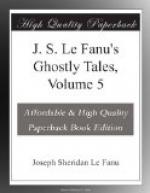There was a silence quite unnatural over the place. The distant murmur of the brook, which he knew so well, was dead; not a whisper in the leaves about him; the air, earth, everything about and above was indescribably still; and he experienced that quaking of the heart that seems to portend the approach of something awful. He would have set out upon his return across the moor, had he not an undefined presentiment that he was waylaid by something he dared not pass.
The old grey church and tower of Shackleton stood like a shadow in the rear. His eye had grown accustomed to the obscurity, and he could just trace its outline. There were no comforting associations in his mind connected with it; nothing but menace and misgiving. His early training in his lawless calling was connected with this very spot. Here his father used to meet two other poachers, and bring his son, then but a boy, with him.
Under the church porch, towards morning, they used to divide the game they had taken, and take account of the sales they had made on the previous day, and make partition of the money, and drink their gin. It was here he had taken his early lessons in drinking, cursing, and lawlessness. His father’s grave was hardly eight steps from the spot where he stood. In his present state of awful dejection, no scene on earth could have so helped to heighten his fear.
There was one object close by which added to his gloom. About a yard away, in rear of the tree, behind himself, and extending to his left, was an open grave, the mould and rubbish piled on the other side. At the head of this grave stood the beech-tree; its columnar stem rose like a huge monumental pillar. He knew every line and crease on its smooth surface. The initial letters of his own name, cut in its bark long ago, had spread out and wrinkled like the grotesque capitals of a fanciful engraver, and now with a sinister significance overlooked the open grave, as if answering his mental question, “Who for is t’ grave cut?”
He felt still a little stunned, and there was a faint tremor in his joints that disinclined him to exert himself; and, further, he had a vague apprehension that take what direction he might, there was danger around him worse than that of staying where he was.
On a sudden the stars began to blink more fiercely, a faint wild light overspread for a minute the bleak landscape, and he saw approaching from the moor a figure at a kind of swinging trot, with now and then a zig-zag hop or two, such as men accustomed to cross such places make, to avoid the patches of slob or quag that meet them here and there. This figure resembled his father’s, and like him, whistled through his finger by way of signal as he approached; but the whistle sounded not now shrilly and sharp, as in old times, but immensely far away, and seemed to sing strangely through Tom’s head. From habit or from fear, in answer to the signal, Tom whistled as he used to do five-and-twenty years ago and more, although he was already chilled with an unearthly fear.




